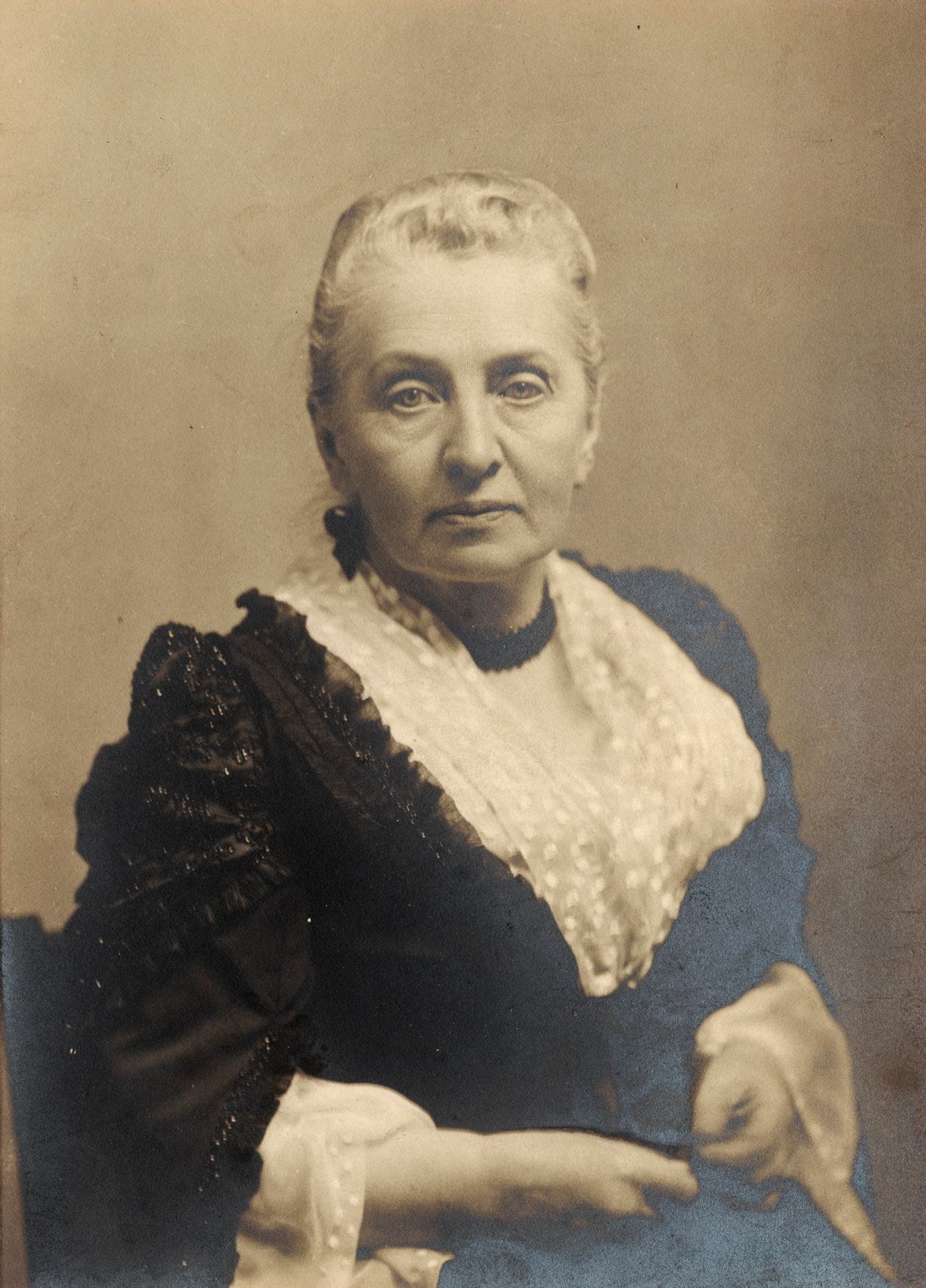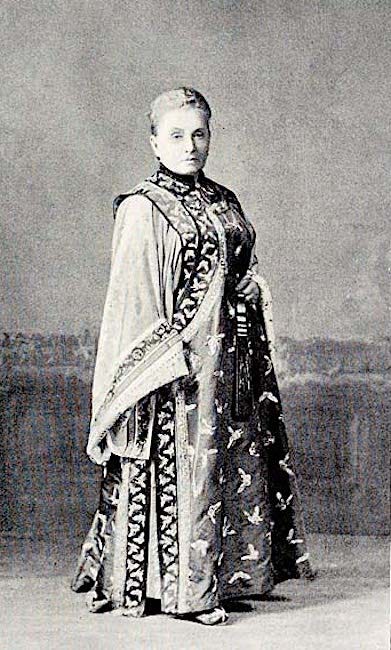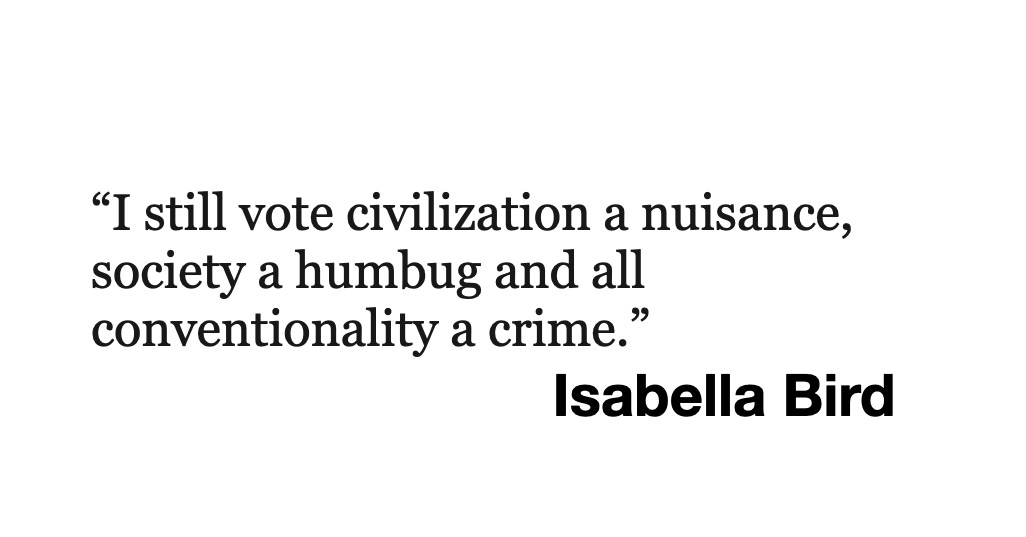The Bird Story
I earned my first byline1 more than 25 years ago2. Over that time, the vast majority of things I’ve written have been published in some form or another.3 I count myself among the lucky ones, even if I haven’t had the runaway success I’ve craved.4
C’est la vie.
But this isn’t really about what has happened. It’s about what never came to be.
I’ve pitched a bunch of shorter pieces that never found a home in print, either because the idea wasn’t ready or because the publication it was perfect for didn’t exist. Those loose ideas live in one folder on my desktop. Every now and again I sift through them to see if circumstances have changed. It’s all good.
But there are a couple of folders dedicated to full-length book proposals that never took off. And one of those proposals is about Isabella Bird.
I know some of the reasons why this book has never found a publisher: I don’t have a gazilion followers; there’s no audience5 for stories about Victorian women who dared; I couldn’t find a good hook; traditional publishing is imploding as a business model; etc.
Which is all true enough, I guess.
But I still think it’s a compelling story. So I’m going to start telling it here.
It won’t be the same as a book, mind. Unless I can stick the dismount6, there won’t be a cogent through-line other than “I think Bird’s life was super interesting and believe you will find it interesting, too.”
One never knows, tho. I’m holding space for a happy accident.
This is Isabella Bird.
In the 1990s Colorado writer Evelyn Kaye wrote Amazing Traveler Isabella Bird, which was a broad overview of Bird’s travels. Kaye recreated Bird’s Japan trip in 2000 in Adventures in Japan: A Literary Journey in the Footsteps of a Victorian Lady. Like me, Kaye was fascinated by Bird and collected everything she could find about her.
I’ll dive into that later. For now, know this: Kaye’s observation sums up the appeal of Bird’s story. Bird was not “breathtakingly beautiful, brilliantly clever, irresistibly sexy, fabulously talented, extremely rich, or adorably young…she was a short, plump, solid, plain woman. She worried about her health, her looks, her abilities….her one passion was adventurous travel, and her skill was to write about her travels passionately. For women everywhere, her books are a breath of intoxicating and entertaining fresh air.”
“A lady an explorer? A traveler in skirts?
The notion’s just a trifle too seraphic;
Let them stay and mind the babies,
or hem our ragged shirts;
But they mustn’t, can’t and shan’t be geographic.”
— Punch magazine (1893).7
Isabella Bird’s first sight of the Moroccan village of Mazagan was from a swaying coal basket, in which she was being transferred from a rocking boat to the sturdy shore. The seas were so rough that cargo could not be unloaded but a short, round 69-year old woman could, if only just. It was January 1900. The 20th century had just begun.
Her trip started on New Year’s Day in Tangier, a destination she’d chosen because she couldn’t fathom spending another cold, damp winter in London. For most of her life, she couldn’t fathom spending more time in either her native England or Scotland than absolutely required so this choice wasn’t unusual. Bird led a peripatetic life, one where she’s sailed to Canada’s maritime provinces as a young, single woman in 1854.
Once in North America, she traveled south to report on the abolitionist movement, of which she was a vocal supporter. After long rest and some family upheaval in England, her wanderlust took her to Australia and Hawaii; to a post-Civil War stay the American West; to a middle-age horseback ride through the heart of Japan. After a brief marriage, she lit out for China and Tibet and India and Persia. And, now, Morocco.
After landing in Tangier, Bird spent days in a rented room laid low by a fever and pain. She was so ill that she missed the announcement of Queen Victoria’s death. She’d met the Queen, who knew of Bird’s books about her travels around the globe, not long before this trip. By 1890, Bird was a household name and her books and magazine articles were eagerly awaited.
During her audience with Her Royal Highness, Bird may have been lobbying for the women lived in poverty in all corners of the Commonwealth, which had become Bird’s biggest cause. She’d organized for the poor in Edinburgh, raised money for starving crofters in the Shetlands in order to emigrate to Canada, and pointed out the inequalities in places like the Malay peninsula in her books and angered the powers-that-be in China when she decried the practice of foot binding. In India, she’d recently opened two hospitals for the lower castes. Travel was its own reward when she’d started writing. Now it was the means to an end.
After learning of the Queen’s death, Bird had to decide if she’d recovered enough to continue on or to return to London, where she could attempt to heal enough to try the trip again later. But, she wrote, “I realized that I must either make up my mind once and for all to ‘give in’ or resort to what proved a panacea before, and quit civilization for the wild.”
Isabella Bird always chose the wild.
Shortly after her decision, she found herself in the coal basket, being whipped by the wind above the Mediterranean Sea. She’d told her doctors that she would only spend her time in Morocco on embroidery, photography, and water-colors. Once on the ground, she was lashed by rain during her ride out to their camp-site. During the night, the heavy and wet end of her tent broke loose and flapped against her head until dawn. By then, the rain had stopped and her mood improved. She and her traveling companions packed up a camel, mule, donkey, and horse and rode 126 miles to Marakesh.
It was, she wrote, “awful.” This city of 80,000 was the “most crowded, nosiest, vilest, filthiest, and busiest city I have seen in the world. It terrifies me.” A few years before this, Bird had escaped from a mob in China, who chased her through the streets calling her a “baby killer” for speaking against selling of young girls into domestic work or prostitution.
A little before that, she’d escaped from the Japanese invasion of Korea with nothing but the clothes on her body. No money. No passport. No documents of any sort. Only good luck and the implied might of the British Empire got her to the Consulate in China.
“I experienced something of the anxiety and timidity which are the everyday lot of thousands,” she wrote, “and I have felt a far tenderer sympathy with the penniless, especially the educated penniless, ever since.”
Even when compared to that harrowing adventure, Morocco was a new level of unpleasant. While she was swept away by majestic vistas and moorish architecture, she was appalled by the people themselves. “The oppression and cruelty are hellish—no one is safe. The country is rotten to the core, eaten up by abominable vices, no one is to be trusted. Every day deepens my hours of its deplorable and unspeakable vileness. Truly Satan’s seat is here.”
Given the decade and her stalwart Christian faith, there’s likely more than a touch of racism and anti-Islamic sentiment at play here. But Bird also spent years crusading against slavery—indeed, one of the reasons she visited the U.S. when she did was to network with abolitionists—and was appalled by the poverty in Marrakesh. Both of those positions can be true, which is an observation we struggle with in this modern age as well.
But that is an argument for later.
Now Isabella is scrambling through the Atlas range on a black horse lent to her by the Sultan. The horse’s saddle is crimson and sits 18” above his back, which means that the barely 5-foot tall Isabella carries a small ladder with her. The travel is rough. Two of the party’s horses are lamed and a mule tumbles off of a bridle track, rolling down and down into the valley without stopping.
“I never expected to do such traveling again,” she writes in a letter home. “You would fail to recognize your infirm friend astride8 on a superb horse in full blue trousers and a short skirt, with great brass spurs belonging to the generalissimo of the Moorish army, and riding down places awful to even think of, where a rolling stone or a slip would mean destruction.”
She closed the letter: “It is evidently air and riding which do me good.”9
Isabella finished her trip with an audience with the Sultan. He is young, dressed all in white, and seated on a raised throne. She is near the end of her life, dressed in black silk, and standing at the base of the steps to his dais. After their brief meeting, Bird wished him long life and happiness. He told her that when his hair was as white as hers, his hope was to have as much energy as she does.
“So I am not quite shelved yet,” she wrote.
Once back in Britain, she started packing for another trip to China, one where she might visit the hospitals she founded in the names of her late husband and sister. That trip never happened, however. Shortly after her return, a fibrous tumor was found in her chest. Her health waxed and waned for a year or two but she never fully recovered. Isabella Bird died in 1904 at the age of 72. Any person who knew her as a child would have been amazed she lived to be 18, much less into her 70s. Simply surviving was a miracle. Thriving should have been impossible.
To be continued…
It was in the Austin American-Statesman for a piece that never did make the transition from print to something electronic. Is it somewhere in the newspaper’s print morgue? Probably—but it is definitely not worth the effort to find it.
Fun fact: I’ve been at this long enough that I occasionally stumble across stories/reviews/posts I have zero memory of having written and/or having seen the show/movie/book that they reference.
I’ve never even flirted with the New York Times bestseller list, much less had a chance to get to first base with it.
allegedly
HIGHLY UNLIKELY BECAUSE THE STRUCTURE WILL BE VIBE-BASED
Bird was about to be one of the first women admitted into the Royal Geographic Society. People (mostly men-type people) had feelings.
women mostly rode side-saddle in this period. Bird had a special riding costume made so that she could ride astride and remain modest.
Hold onto this sentence. It animates Bird’s entire public life.






